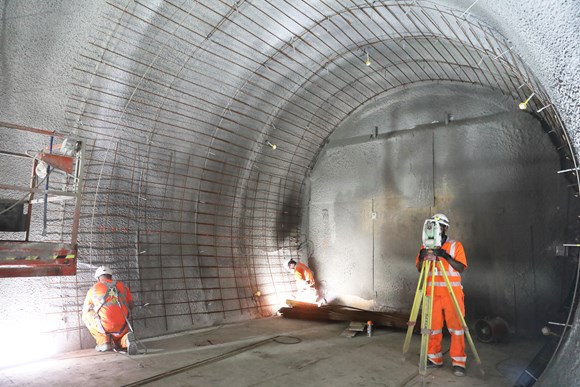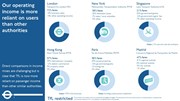
Friday 24 Jul 2020
TfL Press Release - TfL publishes draft revised budget for 2020/21 designed to keep London moving and support UK’s economic recovery

PN-068
- Revised draft budget for 2020/21 sets out to rebuild TfL’s financial stability during the recovery stage of the pandemic
- Budget will ensure services can continue to support London’s recovery and will allow for completion of critical infrastructure projects
- Effects of the pandemic on passenger numbers means that TfL will require further Government support
- New sustainable funding model required in the longer term
Transport for London (TfL) has today published its draft revised budget for 2020/21, which outlines how the organisation will continue to support London’s recovery from the pandemic, benefiting the UK economy as a whole. Should sufficient Government funding be forthcoming for the second half of the current financial year, these revised plans will enable TfL to maintain its statutory obligation to balance its budget, keep its assets safe and operable, and progress an investment programme focused on safety, active travel and completing projects that aid social distancing or support significant economic growth.
The budget includes upgrades to the Tube network such as finishing the Northern Line Extension, completing the Bank station upgrade and introducing new trains on the Piccadilly line. It also includes continued investment in the far-reaching programme to enable more walking and cycling. TfL also intends to build on recent huge improvements in air quality by expanding the Ultra-Low Emission zone to inner London in October next year.
However, the revised budget inevitably involves very difficult choices having to be made about the pace at which the beneficial projects TfL wants to deliver can be funded and completed. The budget sets out which projects TfL intends to advance in the short term and which projects would require further certainty over Government support before they could be progressed. Without the revised funding model that London needs, which would give long-term certainty of sustainable funding, some projects will be unable to progress.
Prior to the coronavirus pandemic, TfL had made huge strides to improve its financial resilience. During the last four years it had made almost £1bn of savings across the organisation and had built up cash reserves of more than £2bn. As recently as March 2020, TfL was on track to reduce its like-for-like operating deficit for the fourth consecutive year, with a firm plan to turn this into an operating surplus during 2022/23.
However, following the 2015 Government Spending Review TfL no longer receives a Government Operating Grant, and around 70 per cent of TfL’s income to operate the network comes from fares. This compares to 38 per cent in New York and 47 per cent in Madrid’s transport system and meant that TfL’s financial model was simply not built to withstand the coronavirus pandemic. London is one of the only major city in Europe without a Government grant to cover its day-to-day operations.
As part of the national Government strategy to combat the virus, TfL helped rapidly and significantly to reduce public transport use. This helped save lives. But, at its peak, TfL’s passenger income was reduced by more than 90 per cent compared to last year, which necessitated the Government providing financial support of up to £1.9bn to TfL in May 2020, In the form of a £1.6bn initial grant and loan package and a further £300m contingency, to ensure transport services in the capital could continue to operate effectively until October 2020.
Since then, TfL has worked to meet the Government conditions set within the funding and financing agreement and has returned services to near pre-pandemic levels of frequency to support the gradual easing of restrictions and the return of increasing numbers of customers. These measures, plus the minimisation of costs, means that TfL now expects to use £1.5bn of the £1.6bn available until October 2020 and does not need to use the £300m contingency which was available.
The Emergency Budget, published in May 2020, set out the need for up to £1.9 billion for the first half of 2020/21 and £3.2 billion for the full financial year, based upon early estimates from April 2020 of the impact of the coronavirus pandemic on TfL's revenues. This Revised Budget anticipates TfL needing up to £3.5 billion for the full year, based upon current assumptions of the revenue shortfall due to the ongoing impact of the pandemic.
This is up to £300m more than TfL previously outlined for the full year in its Emergency Budget. Due to elements of the revenue impact and capital investment moving to later in the year to preserve cash, TfL will need up to £2 billion funding for the second half of the year. While latest modelling shows that ridership on public transport is likely to remain significantly down for the foreseeable future, there remains a large degree of uncertainty around future social distancing assumptions and the threat of a further pandemic-related suppression of demand. This could mean that TfL may see passenger income vary within a range of approximately +£500m to -£235m.
In order to stabilise TfL’s financial position, it is anticipated that a further £2.9bn will be required during 2021/22 which will enable the transport network to operate effectively and support the UK’s wider recovery. TfL’s budget assumes that there will be no new borrowing during 2021/22 as this would require further funding support to make the necessary repayments.
The revised budget would see TfL invest £1.4bn into vital capital projects across London, which includes:
- Continuing the delivery of the Northern Line Extension and Barking Riverside Extension, which between them will support the delivery of more than 30,000 new homes across London;
- Delivering the Mayor and TfL’s ambitious Streetspace programme which has already seen 17km of new cycle lanes created, with a further 20 km under construction, and more than 15,000m2 of widened footpaths created across London to ensure that the economic recovery of the city avoids being car-led, with the serious impacts on health, safety and air quality that would entail;
- Ensuring safety remains paramount across the network by continuing to deliver a package of work which will support TfL’s Vision Zero commitment for all deaths and serious injuries to be eliminated from London's transport network by 2041;
- Finishing work on step-free schemes at nine London Underground stations, with Cockfosters and Amersham set to be completed in the coming months which will help those with accessibility needs to access the Tube network more easily;
- Progressing work on a new fleet of trains for the Piccadilly line and DLR, while continuing vital life-renewal works to existing stock so they can remain in service for longer;
- Continuing work to improve London’s air quality through new electric and hydrogen-powered buses, zero-emission capable taxis and progressing the expansion of the Ultra Low Emission Zone to cover all roads within the North and South Circular from October 2021;
- Restarting proactive maintenance work on the capital’s roads, including work on more energy efficient traffic signals and completing infrastructure restructure renewals to bridges and tunnels;
- Working with the Department for Transport to develop the business case for further rail devolution of suburban rail services in London to TfL.
However, TfL has had to respond to the new economic circumstances, and has set out in the budget how it proposes to reduce capital investments this financial year. This will mean that a number of schemes have to be paused, including the Rotherhithe to Canary Wharf ferry and the transformation of Croydon Fiveways junction.
Longer-term certainty from Government on funding will allow investment in further schemes to create the vital shift away from private car use and to ensure London continues to thrive. TfL remains primed to pivot its investment towards a green recovery, supporting sustainable travel and London's international position. The major future transport schemes in the Mayor's Transport Strategy, such as the proposed DLR extension to Thamesmead, the Bakerloo line extension and Crossrail 2, are still relevant and aligned to the Government’s decarbonisation plan. TfL will continue its discussions with Government, whilst being realistic about what will be affordable over the next decade and where possible, safeguarding and feasibility work will continue on these schemes, while further funding options to deliver these are identified.
Projects in London support the whole of the UK economy. For every pound that TfL spends on improving the London Underground network, up to 55p is received by workforces located outside London. 43,000 UK jobs are supported by the TfL supply chain, 68 per cent of which are outside of London. This includes jobs constructing new trains in Derby and Goole, building buses in Falkirk, processing steel in Scunthorpe and many more.
The Mayor of London, Sadiq Khan, said: “In the years I’ve been in office, I’ve ensured that Transport for London was in a strong financial position despite London being one of the only major cities in Western Europe without a Government grant for day-to-day transport operations. Coronavirus has had a devastating effect on TfL’s finances, which rely on fare income. Prior to the pandemic TfL were on course to reduce their operating deficit by 86 per cent and increase their cash balances by 31 per cent. TfL’s revised budget, should sufficient funding be provided by the Government in the months ahead, will keep services running safely and support London’s recovery from the pandemic.”
Andy Byford, London’s Transport Commissioner, said: “Prudent financial management had placed TfL on the cusp of breaking even for the first time in its history and with strong financial reserves. However, the pandemic revealed that the current funding model, with its unusually heavy reliance on fare revenue, simply doesn’t work when faced with such a shock.
“Our revised budget looks to keep our services running safely, while we do what we can to continue the vital capital investment which will help London recover from the pandemic.
“Inevitably, very difficult choices have had to be made about the pace at which projects can be funded and completed. In the current climate, some projects will have to be paused. We have a real chance, through our supply chain, to support jobs across the UK and help the country recover from the pandemic through a wide range of ‘shovel ready’ projects that support economic growth and build the green economy.”
The revised draft budget will be considered at the TfL Board meeting on 29 July 2020. Starting at 10AM, it will be viewable at https://www.london.gov.uk/tfl-board-2020-07-29
TfLs Revised Budget is available to view here:
tfl.gov.uk/board-20200729-item09-finance-report-revised-budget.pdf
Contact Information
TfL Press Office
Transport for London
0343 222 4141
pressoffice@tfl.gov.uk


